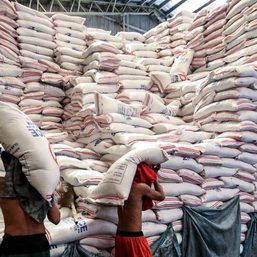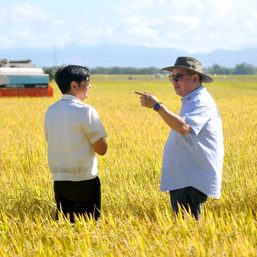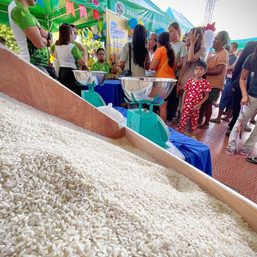SUMMARY
This is AI generated summarization, which may have errors. For context, always refer to the full article.
![[ANALYSIS] The department of ambivalent, if not ambiguous agriculture](https://www.rappler.com/tachyon/2024/05/department-of-ambivalent-05252024.jpg)
While Ferdinand R. Marcos Jr. declared that he had finally let go of personally managing the Department of Agriculture (DA) portfolio, supposedly surrendering it to more experienced and capable hands, from recent developments specifically on the controversial rice issue, it has become obvious that Marcos did not cut and cut cleanly. The ghostly admonition his father received from the late Nevada senator Paul Laxalt as a dictator was being driven out of power, that he must then “cut, and cut cleanly” is a haunting whisper from darker days past.
Those days remind us of self-delusions. Should he remember those fateful hours, it is timeless advice best heeded.
Marcos claimed that he wanted the DA portfolio so that he might institute structural reforms and only upon setting those in motion would he surrender the helm. What those reforms were remain un-identified, perhaps even unpursued as the agricultural crises from the supply and pricing of rice to the grander issue of systemic food insecurity persist.
Of the extraneous baggage Marcos as DA secretary carried upon his shoulders – massive loads he constantly lost grip of as he failed to understand its basic economics – there is evidence that the incompetence prevalent then had, like slimy earthworms, simply burrowed deeper.
It all began with divisive disunity and internal hostility among the DA’s agency heads, mostly involving importation policies that benefit entities in the downstream food value-chain beginning from where farmers are virtually outed and traders, wholesalers, retailers, and the cartels come in. The variations on the same theme are merely where one chain involves sugar, or onions, garlic, vegetables, or rice. The importation policies were a constant and common denominator.
The other commonality was the absence of intelligent leadership despite an umbilical cord to the Office of the President. Note the constant and cloying negativity that accompanied a series of reassignments, resignations, demotions, and firings. Note also where survivors readily rally even around the most ludicrous placebos and palliatives that sought to repeal even the law of supply and demand.
Eventually, the appointment of Secretary Francisco Tiu-Laurel was more than a breath of fresh air for the DA. It had come at a time when the public was experiencing the highest headline inflation rates caused primarily by food inflation and the terrible mismanagement of food supply and security. While the DA attempted to pin blame on external factors from a global shortage caused by geopolitical conflicts in distant hemispheres and the protectionism of major grain producers, the internal wars within the DA did not escape the scrutiny of a public enamored by kitschy bureaucratic catfights.
Secretary Tiu-Laurel stepped in when policy conflicts between an obvious bias for more importations against a refocusing of priorities towards local farmer assistance and production were tearing the DA apart.
But the continuing rice crisis is a case of a bad penny that simply won’t go away. It is not only indicative of continuing disunity, but it serves as a post-mortem forensic autopsy of the DA’s policy-making processes hindering Tiu-Laurel from effectively leading the department.
Specifically, it reveals a diabolic dichotomy between conflicting priorities. When the DA pushed for the Rice Tariffication Law (RTL) the policy direction seemed to refocus supply-side initiatives from the government to the private sector catalyzing importations rather than domestic production for as long as the importation toll creating a subsidy fund was paid by importers. Not only did it require the necessary financial wherewithal of an importer, but it also concentrated both supply control and gross revenue benefits among a select few relative to our much larger domestic farmer population.
For as long as there were no global shortages and foreign markets exported at reasonable prices, the RTL, despite its tariff impositions, flooded markets by opening supply to foreign rice exporters. Unfortunately, that backburnered relative domestic farmer welfare. But never mind domestic farmer inequities. Signature disinformation rhetorics and faux empathy can manage those never-ending pleas. Marcos cannot forget his P20 per kilo promise and pricing was his priority regardless of source and regardless of domestic productivity or its absence.
Anyway, both gross domestic product (GDP) and per capita GDP were alien concepts to the greater public. So was the absence of true economic inclusivity despite the bold and brazen braggadocio constantly behind the government’s GDP growth mantra. In contrast to the economics, the price of a kilo of rice was not an alien concept. Even simpletons breathing the thinnest air at the summit understood that.
As Tiu-Laurel correctly immersed himself by learning and analyzing not only the dysfunctional bureaucratic vagaries dumped at his lap, we are certain that the policy conflicts created by the RTL did not escape his scrutiny.
There were trade-offs to factor in. More attuned and open to consulting and actively listening to well-meaning and expert agriculturists and professionals, Tiu-Laurel started to institute the kind of structural reforms expected of a professional DA secretary. His focus was obvious. He wanted to increase food security and thereby rationalize prices by empowering upstream farmers inside their farmgate rather than the few post-harvest downstream importers.
But Tiu-Laurel was playing a long game and political imperatives, and another shift in policies threatened as the midterm elections loomed on the horizon. Again, trade-offs menace, and extraneous variables enter the equation. For him, the policy turn-around empowering the National Food Authority (NFA) as a principal rice importer should be temporary, like Marcos’s ridiculous attempt to cap rice prices last September 2023. Hopefully, it is not as temporary as the dictatorial declaration of martial law that spanned from 1972 to 1986, then also attributable to an uncontrollable economic crisis and an imagined insurgency.
In 2019, the RTL empowered private importers and traders as it removed from the NFA the principal role of import intervention, relegating its powers to emergencies when supplies fell below demand. It removed quantitative restrictions which hurt domestic farmers, but it also created the Rice Competitive Enhancement Fund (RCEF) hoping to re-channel revenues to local producers. The other impetus for the policy shift was the agency’s tarnished reputation. Its speckled past reeked of cronyism and bias.
Unfortunately, the ambivalence, ambiguities and disunity that burrowed under the DA have resurfaced. So did self-delusional perspectives that repealing cost-plus algorithms and having government provide honest competition as a buffer to temper high prices. DA officials pray this will not eventually distort pricing.
But it will. The unrestricted “import high-sell low” NFA model imposes an effective subsidy tempered only by the non-application of import duties against the coexisting RTL model where these duties bankroll the RCEF. The NFA model waters this down, and once more, our farmers will be at the losing end. With both cohabiting, rice pricing becomes artificial, ambiguous, and as unreal as the promise of a P20.00 per kilo bag of rice. – Rappler.com
Dean de la Paz is a former investment banker and managing director of a New Jersey-based power company operating in the Philippines. He is the chairman of the board of a renewable energy company and is a retired Business Policy, Finance, and Mathematics professor. He collects Godzilla figures and antique tin robots.
1 comment
How does this make you feel?



![[Just Saying] SONA 2024: Some disturbing points](https://www.rappler.com/tachyon/2024/07/TL-marcos-sona-points-july-23-2024.jpg?resize=257%2C257&crop=335px%2C0px%2C720px%2C720px)






![[ANALYSIS] How one company boosts farmer productivity inside the farm gate](https://www.rappler.com/tachyon/2024/06/bioprime-farmgate-farmer-productivity-boost.jpg?resize=257%2C257&crop=465px%2C0px%2C1080px%2C1080px)


![[In This Economy] Why amending the Rice Tariffication Law will reopen Pandora’s box](https://www.rappler.com/tachyon/2024/05/amending-rice-tarrification-may-17-2024.jpg?resize=257%2C257&crop=583px%2C0px%2C1080px%2C1080px)
First, I strongly disagree with the statement that “Marcos cannot forget his P20 per kilo promise.” The stark contrast between this promise and the current situation, where he now portrays someone with amnesia, similar to the Mayor in the Senate probe, is undeniable. Second, this shows the work of this government’s disinformation machinery: “But let’s disregard the inequities faced by domestic farmers. Signature disinformation rhetoric and false empathy can handle those never-ending pleas.” Third and finally, Sir Dean De La Paz’s assessment of the Department of Agriculture as plagued with “divisive disunity and internal hostility,” “absence of intelligent leadership,” and “diabolic dichotomy between conflicting priorities” is realistic and relevant. Ultimately, all of these aspects reflect the mindset and leadership of our beloved President Marcos Jr.